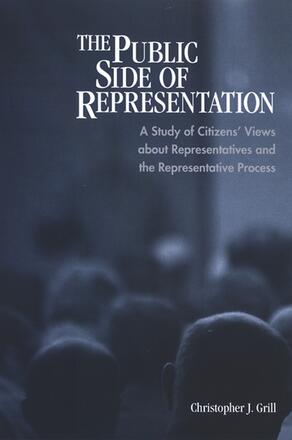
The Public Side of Representation
A Study of Citizens' Views about Representatives and the Representative Process
Alternative formats available from:
Examines how ordinary citizens view the representative process in Congress.
Description
Representation lies at the very heart of our political system, yet few attempts have been made to examine citizens' views about the representative process. The Public Side of Representation fills that void. Through a series of in-depth interviews, Christopher J. Grill explores people's abstract beliefs about representation, expectations for members of Congress, views on the representative-constituent relationship, and conceptions of Congress as an institution. The resulting analysis describes what the participants view as the essential building blocks of the representative process, depicts how they think representatives should make voting decisions, explains what they believe are the most important roles for members of Congress, and appraises their understanding of the actual representative process. Highly readable and accessible, The Public Side of Representation provides greater insight into American politics, citizens' expectations about government, and the roots of public discontent with the contemporary political process.
Christopher J. Grill is an independent research consultant living in Rensselaer, New York.
Reviews
"…an exploratory work that challenges us to ask new questions, [this book] is … a success." — Journal of Public Administration
"Representation is full of dilemmas. Using carefully structured and meticulously reported in-depth interviews, Christopher Grill shows that most citizens see those dilemmas clearly and are prone to resist simplistic solutions. In the tradition of Lane and Gamson, he shows that we can learn a great deal by letting ordinary people speak to difficult issues in their own words. The book is important both as a demonstration of the value of in-depth interviewing and for its contribution to our understanding of Americans' attitudes toward political institutions." — Paul J. Quirk, coauthor of Deliberative Choices: Debating Public Policy in Congress
"This insightful book reveals, as no other has, how strongly many constituents feel about communication—especially two-way communication—and political courage in their representatives. Constituents may also be more willing to be told unpalatable truths and may understand better the difficulties of representatives balancing the competing demands on their time than we have thought. An invaluable door has been opened to further research and institutional invention." — Jane Mansbridge, coeditor of Oppositional Consciousness: The Subjective Roots of Social Protest